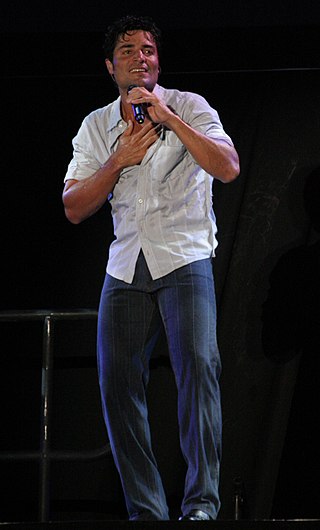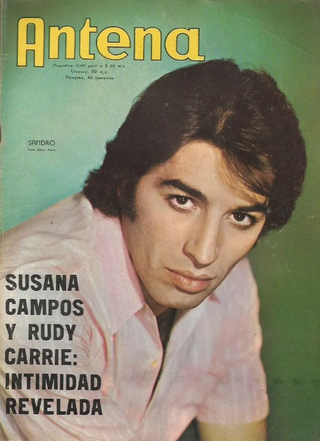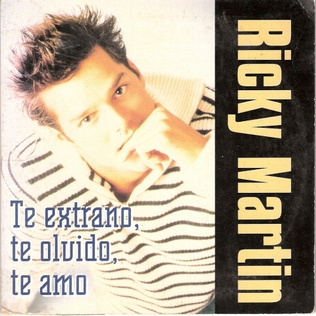
Elmer Figueroa Arce, better known under the stage name Chayanne, is a Puerto Rican Latin pop singer and actor. As a solo artist, Chayanne has released 21 albums and sold over 15 million records worldwide, making him one of the best-selling Latin music artists.

Gloria de los Ángeles Treviño Ruiz, known as Gloria Trevi, is a Mexican singer, songwriter, dancer, actress, television hostess, music video director and businesswoman known as "The Supreme Diva of Mexican Pop". Since 1998, her name has been linked to the Trevi-Andrade Clan, an organization with cult-like overtones accused of sexual abuse, corruption of minors and labor exploitation, led by Trevi's former representative, Sergio Andrade.

Roberto Carlos Braga is a Brazilian singer-songwriter, also known as "King of Latin Music" or simply "the King". Most of his songs were written in partnership with his friend, singer and songwriter Erasmo Carlos. Roberto Carlos has sold over 70 million albums around the world. He is considered one of the most influential artists in Brazil, being cited as a source of inspiration by many artists and bands. His net worth is estimated at US$160 million.

Marisela Hernandez, commonly known as simply Marisela, is a Mexican-American singer. In 1984, she recorded her first album at the age of 18, and continued to release albums into the 1990s. Her cover version of Barbara George's single "I Know ", titled "Ya No", peaked at number-one in the Billboard Latin Songs chart in 1990. As a child she starred in Villa Alegre.

José Martín Cuevas Cobos, known by his stage name Pedro Fernández, is a Mexican singer, songwriter, actor, and television host. Fernández began his international career as Pedrito Fernández at the age of seven.

Manuel Álvarez-Beigbeder Pérez, better known as Manuel Alejandro, is a Spanish composer of Latin love songs, which are better known as ballads. He has written, composed, and arranged songs for the likes of Luis Miguel, Plácido Domingo, Nino Bravo, Julio Iglesias, Raphael, Hernaldo Zúñiga, José José, José Luis Rodríguez, Emmanuel, Enrique Guzmán, Isabel Pantoja, Rocío Jurado, Rudy Marquez, and Jeanette, among many others.

Spanish Harlem Orchestra is a Latin dance music orchestra based in the United States, founded by Aaron Levinson and Oscar Hernandez.

Roberto Sánchez-Ocampo, better known by his stage names Sandro or Sandro de América, was an Argentine singer and actor. He is considered a pioneer of Argentine rock for being one of the first rock artists to sing in Spanish in Latin America. He edited 52 official records and sold eight million copies although other sources state that he sold over 10 million. Some of his most successful songs are "Dame fuego", "Rosa, Rosa", "Quiero llenarme de ti", "Penumbras", "Porque yo te amo", "Así", "Mi amigo el Puma", "Tengo", "Trigal", and "Una muchacha y una guitarra". The single "Rosa, Rosa" sold two million copies, being his most recognizable and famous song. Another of his hits, "Tengo" was given 15th place among the 100 best Argentine rock songs by both MTV and Rolling Stone magazine. In Latin America he was often compared to Elvis Presley at the height of his popularity.
Encarnita "Kany" García de Jesús is a Puerto Rican singer and songwriter. Born in Toa Baja, Puerto Rico, García first appeared on television in 2004 as a contestant on Objetivo Fama. She is widely considered the most successful non-winner in the history of the show.

Miguel Rafael Martos Sánchez, often simply referred to as Raphael, is a Spanish singer and actor. Raphael is recognized as one of the most successful Spanish singers worldwide, having sold more than 70 million records in 7 languages. Currently, he is considered one of the most active singers of the so-called "divos of the romantic ballad", touring throughout America and Europe, transmitting for 60 years of artistic career, a repertoire full of novelty, for which his oldest songs are being recorded again, thus remastering with modern sounds closer to today's youth.

Myriam Raquel Hernández Navarro is a Chilean singer, songwriter and television presenter. She has dabbled mainly in romantic ballad, which is why she is sometimes nicknamed "La baladista de América", although she has also fused her style with other genres such as electronics or hip-hop.

Elvis Martínez a.k.a. El Camarón is a Dominican singer, songwriter, and guitarist. He is a well known Bachata artist from the Dominican Republic. He is known for hits such as "Maestra", "La Luz De Mis Ojos", "Asi Te Amo", "Yo Te Voy Amar", "Laudano", "Directo al Corazon", "El Profesor","Aventura", among others.
Voz Veis was a Venezuelan sextet that released their last studio album "Acústico... Una Noche Común y Sin Corriente" in 2010. They recorded 7 studio albums; the first, Lo Mejor Aún Está Por Venir in 1997. The group had 6 lead singers: Carlos Labrador, Luis Fernando "Luigi" Castillo, Roberto Zambrano, Gustavo González, Santiago Castillo, and Luis Enrique Leal.
Los Yonic's are a Mexican grupero band formed in 1975.
Lourdes Robles is a singer-songwriter and actress, born in San Juan, Puerto Rico. Her career started in the early 1980s as part of duo Lourdes y Carlos, releasing two albums. The duo split and Robles began a solo career, acting in "Barrio Cuatro Calles" and "Generaciones", along Puerto-Rican performer Chayanne. She also performed in some musical productions, including Hello, Dolly!, Into the Woods, and The Fantasticks.

"Te Extraño, Te Olvido, Te Amo" is a song recorded by Puerto Rican singer Ricky Martin for his third studio album, A Medio Vivir (1995). The song was written by Carlos Lara, while the production was handled by K.C. Porter. It was released to radio stations and on CD by Columbia Records as the lead single from the album on September 5, 1995. A Spanish language soft ballad, it is about the singer's dream woman who has left him and as he struggles to forget her, he becomes depressed. It received widely positive reviews from music critics, who ranked it among Martin's best ballads.
Los Guardianes del Amor were a Mexican band formed in 1992. They were the grupero act with the most nominations for Latin Grammy Award for Best Grupero Album with five, but have never won the award. The band's five original members are Arturo Rodríguez, Óscar Saúl Cervantes, Daniel Poplawsky, Pablo Calderón and Ernesto García.
This article includes an overview of the major events and trends in Latin music in the 1980s, namely in Ibero-America. This includes recordings, festivals, award ceremonies, births and deaths of Latin music artists, and the rise and fall of various subgenres in Latin music from 1980 to 1989.

Mexican entertainer Paulina Rubio has released four video albums and has appeared in fifty-four music videos and three guest appearances. From her debut studio album La Chica Dorada (1992), she released music videos for the singles "Mío" and "Amor De Mujer", all directed by Ángel Flores and released from 1992–93. For the first of these, she earned an nomination ERES Award for Best Video. She followed with three other music videos from her second album 24 Kilates (1993): "Nieva, Nieva", "Él Me Engañó" and "Asunto De Dos", directed by Ángel Flores, Daniel Gruener and Tito Lara, respectively. Rubio's third studio album El Tiempo Es Oro (1995) spawned the singles "Te Daría Mi Vida" and "Nada De Ti", whose music videos was directed by Carlos Marcovich. This was followed by Planeta Paulina's videos: "Siempre Tuya Desde La Raíz", a futuristic video with a concept cosmic and 70's dance, "Solo Por Ti", recorded in a barren desert of Mexico, and "Enamorada", which tells the story of gay couple. The three videos was directed by Tito Lara from 1996-1997.
This article includes an overview of the major events and trends in Latin music in the 1970s, namely in Ibero-America. This includes recordings, festivals, award ceremonies, births and deaths of Latin music artists, and the rise and fall of various subgenres in Latin music from 1970 to 1979.













